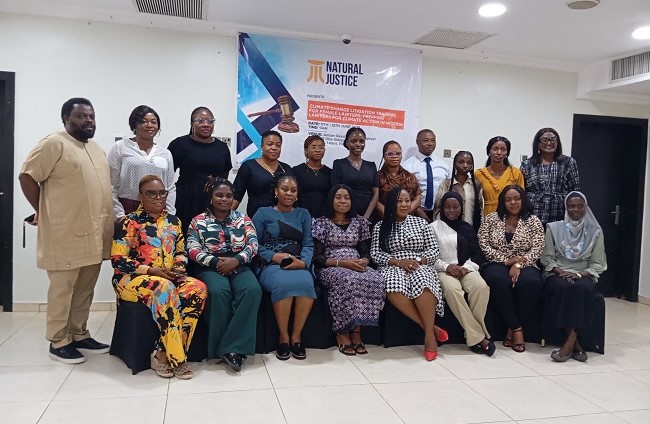A pioneering training workshop on climate change litigation with a focus on equipping female lawyers and female law students from public universities to engage in climate justice advocacy held in Lagos on Wednesday, June 11, 2025.

Organised by Natural Justice, the session was themed: “Climate Change Litigation in Nigeria: Prepping Female Lawyers for Climate Justice in Nigeria”.
Michael Karikpo, the country manager of Natural Justice, stated that the training aims to build the legal capacity needed to confront entrenched policies, outdated laws, and government inaction that continue to worsen the climate crisis.
He added that the workshop arrives at a critical moment for the global community, which is facing multiple climate related emergencies.
“Despite the Paris Agreement and various national climate laws and energy transition plans, the pace of implementation in Nigeria has been notably sluggish across all tiers of government.
“Meanwhile, legal action in other jurisdictions has become an important tool for citizens to compel governments, corporations, and individuals to accelerate climate accountability and drive meaningful change.
“However, Nigeria continues to witness a lack of climate focused litigation. Experts attribute this to limited knowledge among legal practitioners about climate litigation, as well as a broader lack of appreciation for the urgency, complexity, and evolving nature of climate-related legal cases.
“This inaugural workshop is designed to address these gaps, with an emphasis on including women due to their heightened vulnerability to climate change impacts and existing gender disparities in the legal field,” Karikpo stated.
Karikpo highlighted the importance of climate change preparedness in Nigeria and the urgent need for legal mechanisms to hold duty bearers, including governments and corporations accountable.
He stressed that ad hoc charitable responses after disasters are insufficient and called for structured use of available resources to support public awareness, infrastructure development, and environmental protection.
Karikpo also criticised the misuse of public climate funds, such as the Ecological Fund, which he said is often diverted for political or security related expenditures.
He further called attention to the Climate Change Act’s new Climate Change Fund, urging that it be applied directly to adaptation and mitigation efforts.
Additionally, he raised concerns about the judiciary’s readiness to handle environmental cases, citing a lack of judges and lawyers familiar with global climate issues. Nonetheless, he noted that the Supreme Court has affirmed that any citizen concerned about an environmental issue has the right to seek judicial redress.
Sulaimon Arigbabu, the Executive Secretary of the Human and Environmental Development Agenda, (HEDA) Resource Centre, emphasised that Africa bears the least responsibility for global climate change yet suffers some of its worst consequences including drought, desertification, and coastal flooding. He noted that the continent’s weak infrastructure severely limits its ability to recover from climate disasters.
Arigbabu underscored the critical connection between science and climate litigation. He urged lawyers, particularly women, to consult scientific experts and bring them into court as witnesses.
“I mean, it’s not different from lawyers trying to prove that mining, for instance, has affected, has impacted the community, or that what company is doing somewhere has caused water pollution or what have you. What is required is, even if the litigation is about technology, is about AI, first, the lawyers themselves and the communities who are putting the case, we need to understand. And in understanding, they need to learn. And in learning, they need to consult with those who have the knowledge. So that’s why it’s important that first they’re able to know what the realities are.”
He encouraged collaboration with universities and institutions to educate both lawyers and the judiciary on the scientific basis of environmental issues.
According to Arigbabu, Nigerian lawyers must be prepared to demonstrate legal obligations that have been unmet or wrongfully fulfilled in order to establish liability.
Associate Research Professor of Law, Nigerian Institute of Advanced Legal Studies, NIALS, Dr. Izuoma Adindu, stressed the vital role of women in climate advocacy.
She pointed out that although women are disproportionately affected by climate change, they remain underrepresented in Nigeria’s legal profession, which continues to be male dominated.
“The climate change world in the legal profession is gradually being dominated by men. And while we suffer more, there is need for us to reconsider the areas we have prioritised. There is need for us to prioritise the climate change litigation issue, especially female lawyers that are fully engaged in litigation.”
Dr. Adindu called for increased efforts to build legal capacity among female lawyers and law students, especially in public interest litigation. She also advocated for incorporating global trends and gender-sensitive reforms into Nigerian climate law and policy.
“As female lawyers, there is need to build our capacity in this area. There is need for us to engage in public interest litigation. There is need for us to have a redirection and focus on what is globally trending, especially in other jurisdictions. Check it, women are the ones bringing actions to court on climate change matters.”
“But in this part of the world, especially in Nigeria, we seem not to consider it very important. There is need for us to rise up to the challenge, and the time is now. And what do you think the policies of ethnicism must be put in place to ensure that women will embrace this ideology that you are proposing? The first thing to do is what we are doing here right now, capacity building. Building the capacity of female lawyers.”
Furthermore, she emphasised the need for a platform such as Natural Justice that allows female lawyers to network, share knowledge, and strengthen their contributions to climate justice.
“While we are aware that a lot of work is being done in that aspect, but we can see that the work is not really on gender focus. There is need for us to focus on gender, as we are doing right here, and we are pushing Nigeria Justice for giving us this platform to interact, to build the capacity of female lawyers in Nigeria.”
By Kathy Kyari
